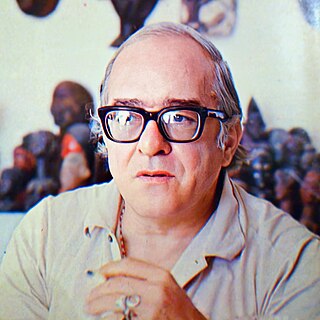
Marcus Vinícius da Cruz e Mello Moraes, better known as Vinícius de Moraes and nicknamed O Poetinha, was a Brazilian poet, diplomat, lyricist, essayist, musician, singer, and playwright. With his frequent and diverse musical partners, including Antônio Carlos Jobim, his lyrics and compositions were instrumental in the birth and introduction to the world of bossa nova music. He recorded numerous albums, many in collaboration with noted artists, and also served as a successful Brazilian career diplomat.

Antônio Pecci Filho, better known as Toquinho, is a Brazilian singer and guitarist. He is well known for his collaborations, as composer and performer, with Vinicius de Moraes.
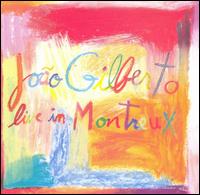
Live in Montreux is a bossa nova album by João Gilberto, recorded live in the 1985 Montreux Jazz Festival and released in 1987. This is a single-disc edition of the double album Live at the 19th Montreux Jazz Festival, released in 1986.

Getz/Gilberto #2 is a live album by Stan Getz and João Gilberto, released in 1966. It was recorded at a live concert at Carnegie Hall in October 1964. The previous album Getz/Gilberto won the 1965 Grammy Awards for Best Album of the Year and Best Jazz Instrumental Album - Individual or Group, among others. The painting on the cover is by Olga Albizu.
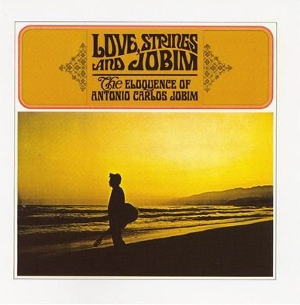
Love, Strings and Jobim is a 1966 album by various Brazilian artists who play new Brazilian songs by various composers. Because Antônio Carlos Jobim is pictured on the cover and mentioned in the title, he has been and continues to be credited to be the performing artist on the album. Jobim does not appear on the album except as a composer of two of the twelve songs. The original Brazilian title of this album is "Tom Jobim Apresenta" and it appeared on the Elenco label.
"Água de Beber" is a bossa nova jazz standard composed by Antônio Carlos Jobim and originally recorded in the key of A minor, with lyrics written by Vinícius de Moraes. The English lyrics were written by Norman Gimbel.

Heloísa Maria Buarque de Hollanda, whose artistic name was Miúcha, was a Brazilian singer and composer.
"Someone to Light Up My Life" is a song composed by Antônio Carlos Jobim, with lyrics by Vinicius de Moraes. It was written for the play Orfeu da Conceição (1956). English lyrics were added by Gene Lees.

Herb Alpert Presents Sergio Mendes & Brasil '66 is the first album by Sérgio Mendes and Brasil '66. It was inducted into the Grammy Hall of Fame in 2011. Referring to the song "Mas que Nada" Mendes said in 2014: "It was the first time that a song in Portuguese was a hit in America and all over the world".
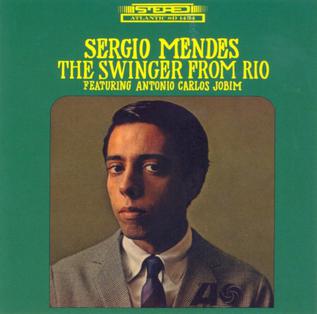
The Swinger from Rio is a 1966 album by Sérgio Mendes. Recorded over three days in December 1964 for the Atlantic label, it features guest artists Phil Woods, Art Farmer, and Hubert Laws, plus Antônio Carlos Jobim on rhythm guitar. It has also been released under the title Bossa Nova York.
"Eu Sei Que Vou Te Amar" is a bossa nova jazz standard composed by Antônio Carlos Jobim and Vinícius de Moraes. The first recording was by the Brazilian singer Maysa, appeared on her 33 rpm LP, RGE - XRLP 5068, published in 1959. Another version was the 13th track on Vinícius de Moraes's 1970 album En 'la Fusa' con Maria Creuza y Toquinho.

Brazil is a 2000 album by Rosemary Clooney. John Pizzarelli accompanies Clooney on vocals on five of the tracks, and sings Antonio Carlos Jobim's "Wave". Diana Krall duets with Clooney on "The Boy from Ipanema". The arrangements primarily feature woodwinds, piano and guitar, and do not feature brass instruments.
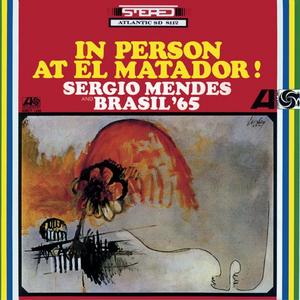
In Person at El Matador is a 1965 live-album by Sérgio Mendes and Brasil '65. It was recorded at El Matador in San Francisco, California
O Bem-Amado is a Brazilian telenovela that first aired on Rede Globo in 1973. It is based on a play by Dias Gomes called Odorico, o Bem-Amado ou Os Mistérios do Amor e da Morte, written in 1962. It was the first Brazilian color telenovela. It was shot in Rio de Janeiro.

Sambalanço Trio is the debut album by Brazilian samba-jazz group Sambalanço Trio, released in 1964. The album was reissued later that year as Samblues.
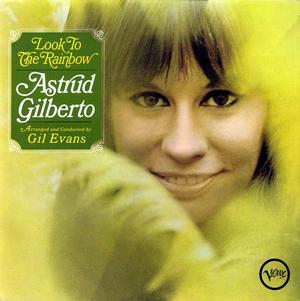
Look to the Rainbow is a 1966 album by Astrud Gilberto, arranged by Gil Evans and Al Cohn.
Orfeu da Conceição is a stage play with music in three acts by Vinicius de Moraes and music by Antônio Carlos Jobim that premiered in 1956 in Rio de Janeiro. The play became the basis for the films Orfeu Negro and Orfeu (1999), and for the musicals Orfeu and Black Orpheus.

Do the Bossa Nova with Herbie Mann is an album by American jazz flautist Herbie Mann recorded in 1962 for the Atlantic label.
"Samba do Avião", also known as "Song of the Jet", is a Brazilian song composed in 1962 by Antônio Carlos Jobim, who also wrote the original Portuguese lyrics. The English-language lyrics are by Gene Lees.
"A felicidade" ("Happiness") is a bossa nova song by Antônio Carlos Jobim, with lyrics by Vinícius de Moraes, composed in 1958 for the French film Orfeu Negro.













